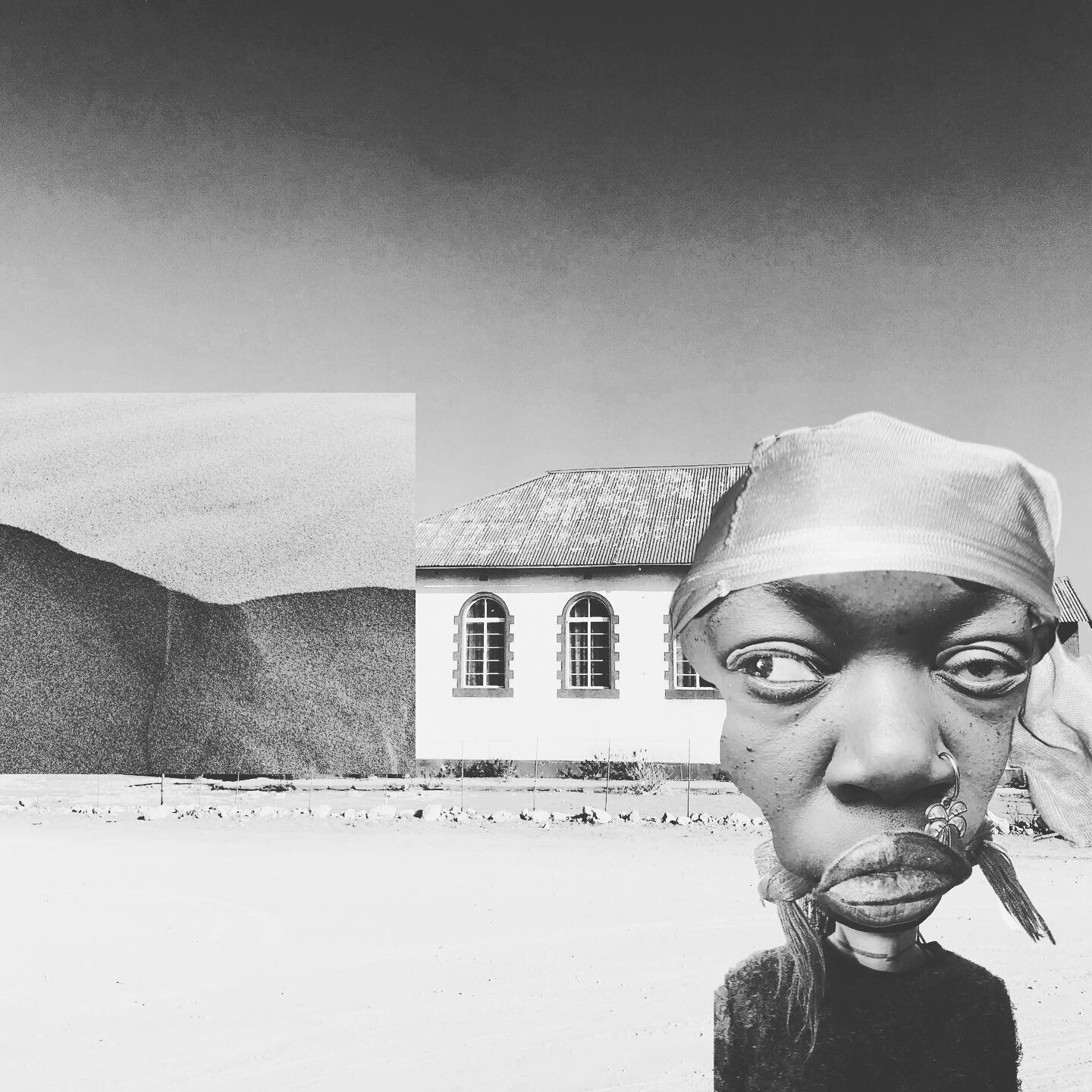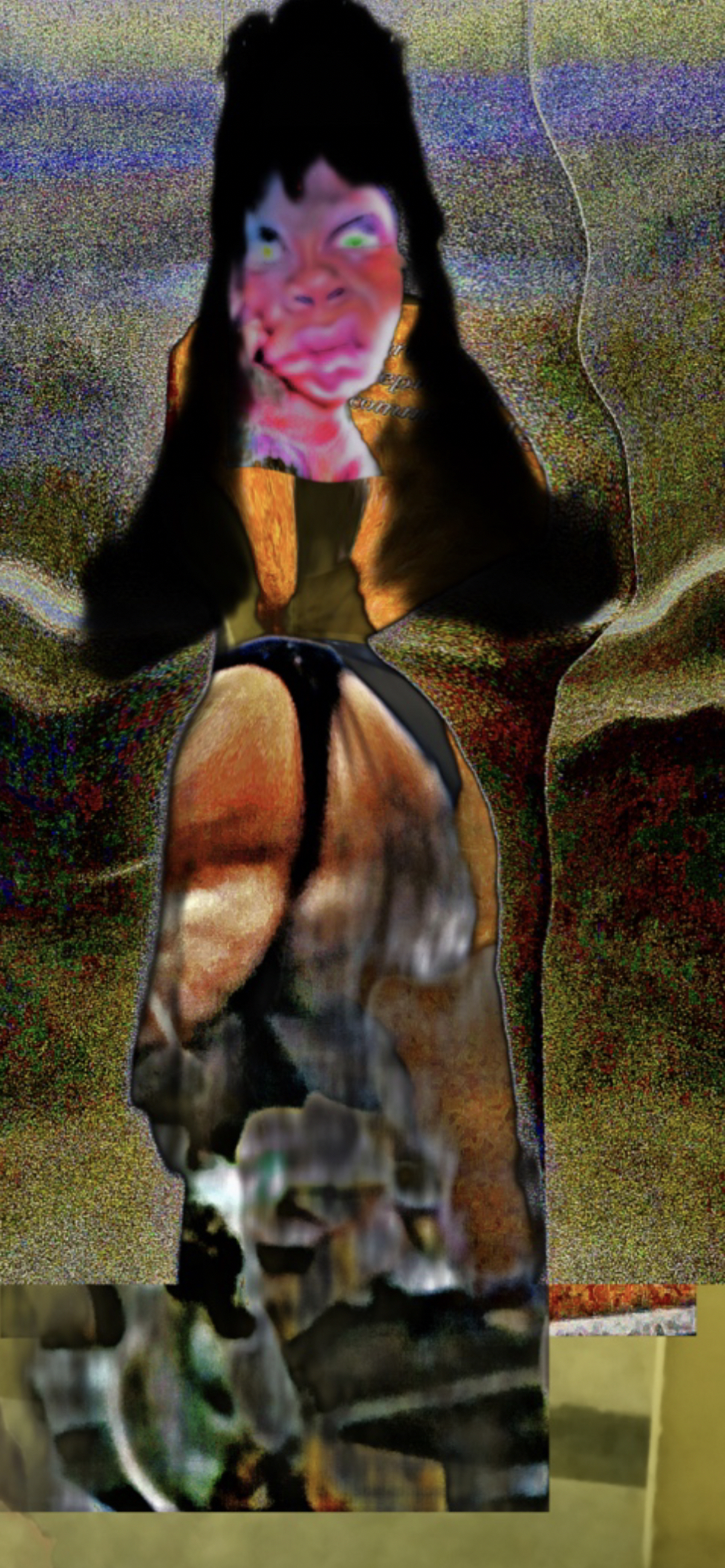FEATURE ︎︎︎
BELOW PERCEPTIONS
Text by Nkosazana Hlalethwa
︎ ︎︎︎ ︎
BELOW PERCEPTIONS
A dig into the private prior to Naledi Chai’s public
Text by Nkosazana Hlalethwa
︎ ︎︎︎ ︎
Naledi Chai’s language is a femme vernacular. It collects. It retracts and refracts. A post-biblical spiritual study, told from the perspective of the congregant that the rapture left behind: her findings are endearing, enraged, ephemeral, all-encompassing and consistent in being ever-changing.

Devoted to mirroring, Chai reflects
reality by making the immaterial parts of our material world (whether fears,
urges, realities or convictions) visible. So far, these manifestations have
taken on varying forms primarily. Collaging. Graffiti. Physical and digital
digging. Coding. Gaming. Collecting. Zine publishing. Researching. Sketching.
Sculpture making. Performance. Convening. Recording, drawing, destroying,
enhancing and presenting.
Through visual, textured and sonic access points, Chai maintains a transdisciplinary practice. “I am always looking to be outside, to be up to shit and to be the one that doesn’t know things. I’m really loving the uncertainty of the space that I work in. That shit makes me feel very much like a child,” she says. In this unfamiliar territory, where there are little to no kinships and nothing familiar to grasp to, Chai becomes a medium, carrying and disseminating messages. “This word medium means something else in my context. It can’t just be collage, oil painting and installation. Certain voices are speaking through me. So this transdisciplinary shit is not something that I do. It’s something that I am,” she offers.
Through visual, textured and sonic access points, Chai maintains a transdisciplinary practice. “I am always looking to be outside, to be up to shit and to be the one that doesn’t know things. I’m really loving the uncertainty of the space that I work in. That shit makes me feel very much like a child,” she says. In this unfamiliar territory, where there are little to no kinships and nothing familiar to grasp to, Chai becomes a medium, carrying and disseminating messages. “This word medium means something else in my context. It can’t just be collage, oil painting and installation. Certain voices are speaking through me. So this transdisciplinary shit is not something that I do. It’s something that I am,” she offers.
Following an initial urge, the conviction
to make passes through a series of negotiations. A response to global resource
limitations (in material and space) Chai addresses the lack of having, with
found objects and alternative approaches to making.
Occupying her studio, time and mind, as this is written, is a sculpture series. A conversation between craft and chicken coup wires, the series is based on, but does not try to replicate, the human form. Gangly, ghostly and gauze-like, the sculptures are accompanied by a sound collage. Blending field recordings, found sound, excerpts from speeches and music, the sonic addition gives movement and bias to the seemingly motionless, neutral beings. Presenting sound as subjective: the work forms part of Chai’s research into what is triggered when we hear. “I’m not telling you anything because I want to know how hearing this feels to you. It’s a question I’m being asked too but I’ve realised that I don’t want to talk about what the work has surfaced in me,” says Chai. “The demarcations of contemporary art can nudge you into a particular dance and it’s a skill to have. But sometimes I’ll sit it out and let the audience go off on their own path.”
Occupying her studio, time and mind, as this is written, is a sculpture series. A conversation between craft and chicken coup wires, the series is based on, but does not try to replicate, the human form. Gangly, ghostly and gauze-like, the sculptures are accompanied by a sound collage. Blending field recordings, found sound, excerpts from speeches and music, the sonic addition gives movement and bias to the seemingly motionless, neutral beings. Presenting sound as subjective: the work forms part of Chai’s research into what is triggered when we hear. “I’m not telling you anything because I want to know how hearing this feels to you. It’s a question I’m being asked too but I’ve realised that I don’t want to talk about what the work has surfaced in me,” says Chai. “The demarcations of contemporary art can nudge you into a particular dance and it’s a skill to have. But sometimes I’ll sit it out and let the audience go off on their own path.”
As porous as the chicken wire she is
engaging, her approach understands the importance of oscillation because the
delicate dance between retaining and relinquishing is necessary for survival,
even when it fails to be palatable. “I don’t know that the things I make are
nice or beautiful. But I am excited by the shape and space they take. And I
think: maybe that’s all I need to know right now.” Open: it knows the
consequences of remaining absolute.
Synonymous with play, the receptive nature of Chai’s practice defies logic’s linearity. Childlike in its contradictions, in process, Chai collects and listens with as much vigor as she discards and neglects because it’s a fearlessness often afforded only to children. “All I do is give in to the urge to make, using the things that surround me. It’s what has kept me making all these years: the capability of the things I make with. I am constantly asking them what they can do. It is in the answers that they give me that I find my reason why,” explains Chai. Established in the early 2010, Fly Machine Projects demonstrates Chai’s many reasons why. “I wasn’t even trying to DJ. I was interested in vinyl and wanted to collect. I would knock on doors, listen to the stories of what these vinyls mean and so I kept digging,” she adds. A movement bringing experimental music to the people, Fly Machine Sessions offers a sensory experience and sonic home for the othered. A mother ship, it presents its audience with the opportunity to voyage through uncharted realms.
Synonymous with play, the receptive nature of Chai’s practice defies logic’s linearity. Childlike in its contradictions, in process, Chai collects and listens with as much vigor as she discards and neglects because it’s a fearlessness often afforded only to children. “All I do is give in to the urge to make, using the things that surround me. It’s what has kept me making all these years: the capability of the things I make with. I am constantly asking them what they can do. It is in the answers that they give me that I find my reason why,” explains Chai. Established in the early 2010, Fly Machine Projects demonstrates Chai’s many reasons why. “I wasn’t even trying to DJ. I was interested in vinyl and wanted to collect. I would knock on doors, listen to the stories of what these vinyls mean and so I kept digging,” she adds. A movement bringing experimental music to the people, Fly Machine Sessions offers a sensory experience and sonic home for the othered. A mother ship, it presents its audience with the opportunity to voyage through uncharted realms.

“I don’t know that the things I make are nice or beautiful. But I am excited by the shape and space they take. And I think: maybe that’s all I need to know right now.”





Sometimes literal, but mostly figurative and conceptual: Chai’s practice also acts as a coded document of black femme lamentations and celebrations. Themes explored here include “image equity, identity, queer visibility, women’s rights and reproductive health”. Take her untitled 2017 microfilm where threads of synthetic hair fibre are bound to a lamp post. A probable protagonist, the hair fibre hovers slightly above the pavement because the wind will not let it sit still. "My whole thing with filming is to make really uncomfortable, extreme shots," she explains. Short and repetitive, a prolonged screening of her films builds a genre of hope that can only come from enduring discomfort. Seen in a loop, it mimics the never quit, never back down gospel of the day, while acknowledging our indissoluble nature.
Brief but impactful, the conversation with Chai dissolves from professional to platonic, landing on the subject of good trauma after she makes a remark about the delayed onset muscle soreness she is experiencing. “I’ve been working with that wire and my body remembers. I’m sore because I remember, that’s that good trauma,” she says smiling. When asked how she would classify it as good trauma, Chai shrugs. “It’s welcomed pain and the speed at which the impact comes is different and expected.” A new layer to the way she navigates her practice, Chai concludes the reflection with relief. “This is the one place where I get to transcend your perceptions of me, your memories with me. I get to transcend that shit.”
Naledi Chai is one of two artists selected to take part in a dual exhibition following the Art After Baby initiative by the Independent Network for Contemporary Culture & Art at the Keyes Art Mile. The exhibition will take place from 2-30 November 2023.
